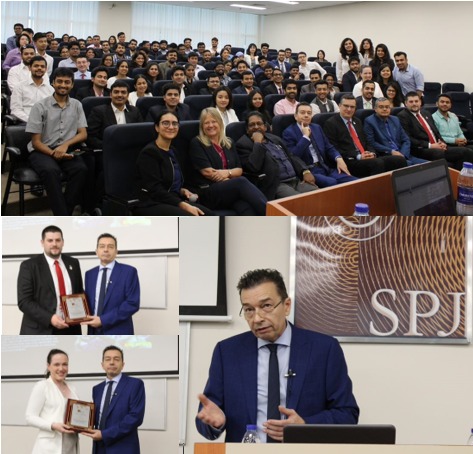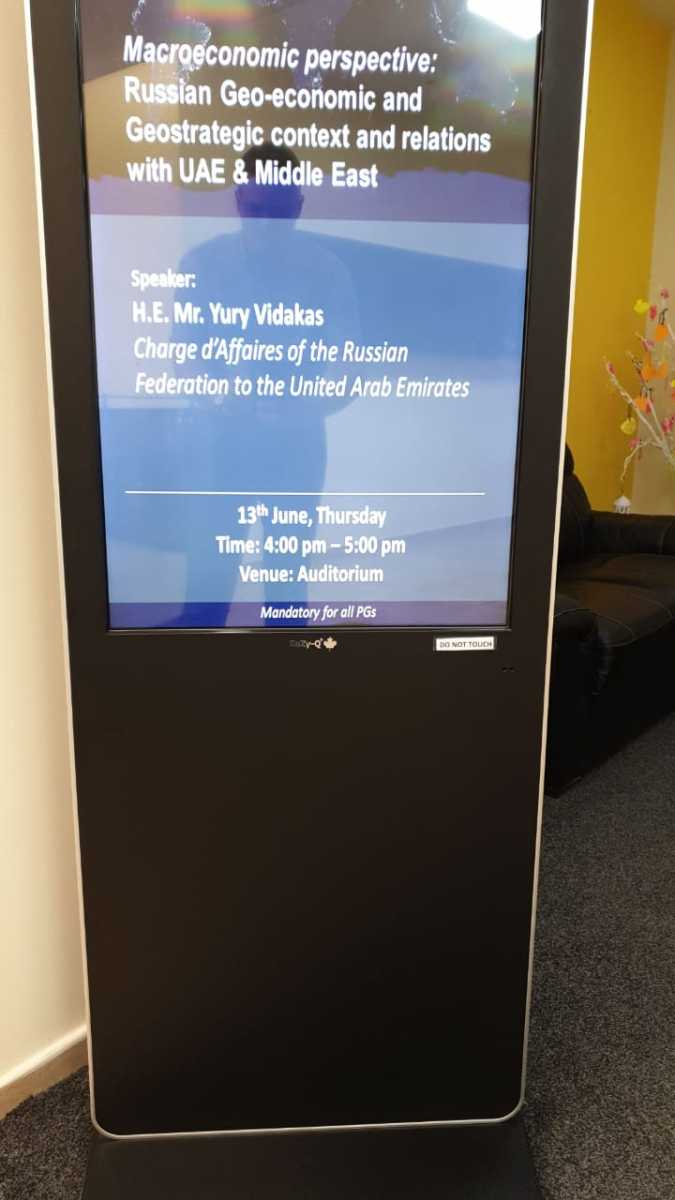Modern world in the view of Russian foreign policy
By Aliheydar_Rzayev Sunday, 29 September 2019 1:09 AM

Charge d'affaires of Russia in the UAE Mr. Yuri Vidakas delivered a lecture at the University of Abu Dhabi on the subject “Foreign Policy of the Russian Federation”. During the lecture Mr. Yuri Vidakas highlighted the concept of foreign policy of the Russian Federation, the Russian position on the Middle East burning issues, as well as bilateral cooperation between Moscow and Abu Dhabi.
- The World is going through fundamental challenges related to the emergency of a multipolar international system.
- Global power and development potential is becoming decentralized.
- Cultural and civilizational diversity of the world open ways for multiple development models
- Eroding the global economic and political dominance of the western traditional powers.
Modern Challenges
- Tensions are rising due to disparities in global development
- Force is becoming an increasingly important factor
- The growing threat of international terrorism and transnational crime
- The International community needs to respond to threats in an adequate and comprehensive manner and combine efforts under the coordinating role of the UN
- Consolidation of international efforts requers a set of common values for joint action, based on the common moral as well as principles and concepts such as aspiration to peace and justice, dignity and freedom.
Basic Priorities of Russian Foreign Policy
- Shaping a Fair and Sustainable World Order
- Rule of Law in International Relations
- Strengthening International Security
- Strengthening Economic Cooperation
- Humanitarian Cooperation and Human Rights
- Russian Federation as a permeant member of the UN SC contributes to the development of a positive, well-balanced and unifying international agenda by relying on substantial resources in all areas of human activity and pursuing a foreign policy that seeks to develop relations with the leading States, international organizations in various parts of the world.
- Russia conducts an assertive and independent foreign policy guided by its national interests and based on unconditional respect for international law.
- Russia is fully aware of its responsibilities to support peace and security in the world both at the global and regional levels and is committed to working with all interested States to address common challenges
- Russian Foreign Policy is open and predictable.
 Russia and the Middle East
Russia and the Middle East
- The Russian Federation continues making a meaningful contribution to stabilize situation in the Middle East and North Africa.
- Russia supports collective efforts aimed at neutralizing threats that emanate from international terrorist groups
- Russia promotes political and diplomatic settlement of conflicts in regional States though comprehensive national dialogue aimed at reaching public accord.
- Russia advocates showing respect for independence, sovereignty and territorial integrity of states in the Middle East and North Africa in full conformity with the principles of international law and the UN Charter and rejects
- Russia rejects attempts to interfere in the internal affairs of states in the Middle East and North Africa.
- Russia supports the efforts to reach a political settlement in Syria based on UN Security Council Resolution 2254 and the results of the Syrian National Dialogue Congress held in Sochi in January 2018. Astana format plays an important role in supporting Syrian political process.
- Russia calls for international assistance for rebuilding Syria and returning refugees.
- Russia rejects the US proclamation on recognizing the Golan Heights as Israeli territory. This violates the related UN Security Council resolutions and the UN Charter and escalates tensions in the region.
- Russia supports creation an independent, viable, and territorially integral Palestinian state within safe borders as recognised in 1967 with the possible equitable exchanges and a capital in East Jerusalem according to the relevant UN resolutions and the Arab Peace Initiative.
- Russia underlines the importance of ensuring peace and security in the Gulf region through promoting the process of building trust and transparency between the Arab states of the Gulf and the Islamic Republic of Iran.
- Russia supports the efforts aimed at creating a zone free of weapons of mass destruction in the Middle East.
Russia – UAE
- Diplomatic relations established on December 8, 1971.
- The UAE is one of the most important partners of Russia in the region.
- Russian-Emirati strategic partnership contributes to maintaining peace and security in the region
- Russia and the UAE signed Declaration of Strategic Partnership on June 1, 2018.
- the Intergovernmental Russian-Emirati Commission on Trade, Economic and Technical Cooperation established in 1994.
- Active efforts are made to increase bilateral cooperation in economic, scientific and humanitarian fields.
- Bilateral trade reached 2 bn US dollars in 2018.
- 25 thousand Russian citizens live in the UAE.
USSR in World War II
- World War Two is the biggest military conflict in human history.
- The USSR played leading role in defeating the Nazi Germany.
- The Nazi Germany lost 70% of its soldiers in the Eastern Front.
- The main battles of WWII took place in the USSR (Stalingrad, Battle of Kursk and etc.)
- The Soviet Army captured Berlin in 1945.
- USSR lost a fifth of its population (26,6 million people) - more than all the other participants in WWII altogether. Military losses – 8,8 million, others – civilians.
- 1,710 Soviet cities, 70 000 villages and 32 000 industrial enterprises were destroyed,
- The Nazis committed planned policy of total extermination and genocide of the Soviet population on the occupied territory.
- Nazi collaborationists played active role in organizing mass murders of civilian populations.
- The memory of the war, referred to as the Great Patriotic War, is particularly venerated in Russia.
- In the USSR the of the war was considered to be May 9. 1945, when the German surrender took effect. This date has become a national holiday – Victory Day.
The Problem of glorification of Nazism
- Russia strongly condemns attempts to reconsider the results of WWII and glorify the Nazi criminals and justify their actions.
- Russia expresses deep concern about the glorification, in any form, of the Nazi movement, neo-Nazism and former members of the Waffen SS organization, including by erecting monuments and memorials and holding public demonstrations in the name of the glorification of the Nazi past, the Nazi movement and neo-Nazism, as well as by declaring or attempting to declare such members and those who fought against the anti-Hitler coalition and collaborated with the Nazi movement participants in national liberation movements.




























Add new comment